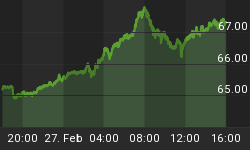Whether a trade war between the U.S. and the EU has just been averted or not is anyone’s guess, and the current atmosphere of renewed love can change on a dime, as the markets have learned many times this year.
Still, as of midday trading on Thursday, global markets were breathing a sigh of relief, as Trump and European Commission chief Jean-Claude Juncker agreed to avoid a full-blown trade war and work to lower tariffs.
Juncker called it a “new phase”, and Trump noted the love in the room.
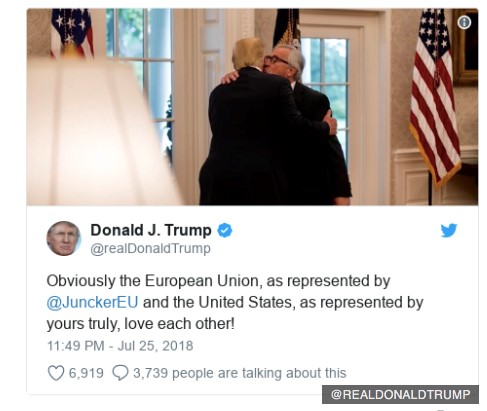
(Click to enlarge)
Tariffs on European cars weren’t mentioned, and a joint statement from the pair promised to “work together toward zero tariffs, zero non-tariff barriers, and zero subsidies on non-auto industrial goods”.
It was, after all, a negotiation—even if negotiations Trump style bring everyone to the brink of war.
The 25-percent tariff on steel and the 10-percent tariff on aluminum that the U.S. slapped on aren’t part of the new love fest—they’re staying put for now.
Juncker said the two leaders also agreed that as long as negotiations were ongoing, "we'll hold off further tariffs and reassess existing tariffs on steel and aluminum" put in place by the Trump administration.
So what did Trump’s tariff game win the U.S., and why the sudden change of heart?
While details are scant, the EU has apparently agreed to buy a ton (figuratively) of liquefied natural gas (LNG) from the US, though we have no particulars about amounts here, with Trump saying only that the EU would become a “massive buyer” of American LNG. (Incidentally, that’s also why Trump is so vehemently opposed to Germany’s new Baltic pipeline project that would increase imports of Russian gas).
Trump also claimed that Brussels agreed to buy more soybeans from American farmers, which he’s hoping will be a big PR win in the aftermath of the most recent debacle over farm aid. Related: China’s Debt Bomb Is Finally Detonating
America’s heartland farmers are up in arms as the financial pain of the trade war sets in. They’ve lost confidence in Trump’s “easy-to-win” trade war strategy, and they’ve lost patience, too, in the face of a nearly 20-percent drop in the price of soybean harvests, and a more-than 15-percent drop in the price of corn.
To win that confidence back, Trump recently proposed a $12-billion emergency farm aid package of direct payments to farmers affected by the tariffs. But it’s a hand-out that tax payers don’t want, and not even farmers are keen on it.
"It's a toss-up. First and foremost, most farmers, we want trade and not an aid package," one Nebraska corn and soy bean farmer told NPR’s Boston outlet, WPUR. "$12 billion seems like a lot from a taxpayer's perspective, but when you put it all across the whole ag industry, it's a drop in the bucket.
And the hugs and kisses for Europe this week won’t alleviate the farmers’ struggle, either. The earlier tariffs are still in place and the biggest pain will come from China, not the EU.
But in the meantime, the markets are responding positively. The Dow jumped later on Wednesday, after the joint Juncker-Trump statement, and was still trading up close to the close Thursday:
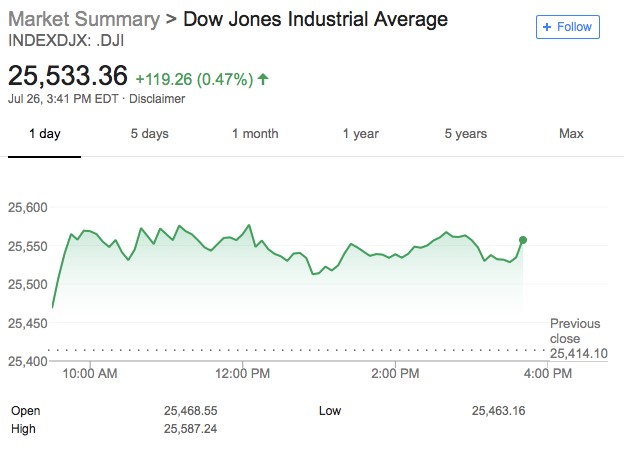
(Click to enlarge)
The S&P 500 index didn’t see the advantage from the trade war cool-off, as both it and the NASDAQ fell on Facebook’s worst day in history.
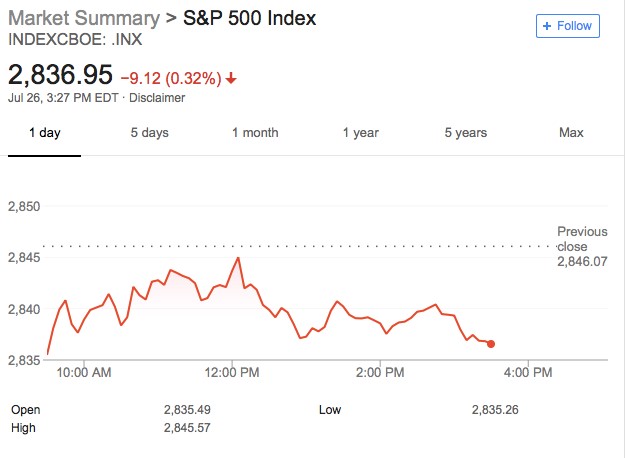
(Click to enlarge)
Asian stocks largely closed mixed Wednesday, but European markets edged higher Thursday on the tariff reprieve, along with the European Central Bank decision to keep interest rates on hold.
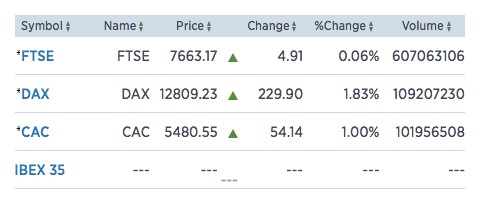
(Click to enlarge)
By Tom Kool for Safehaven.com
More Top Reads From Safehaven.com




